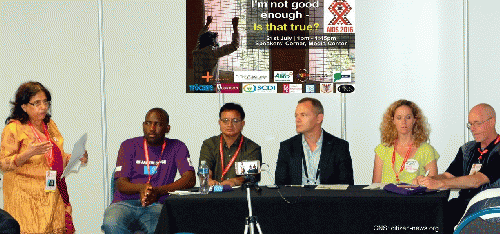Senior HIV activists who have not only helped shape HIV responses on the ground over the years, but also have been living with the virus for several years, shared their personal battle against self-stigma at a press conference session hosted by The Work For Change (www.theworkforchange.org) and partners at the 21st International AIDS Conference (AIDS 2016) held in Durban, South Africa.
Self-stigma or internal stigma (or internalized stigma) is an extremely neglected, yet critical, issue. Almost all of the 50 people living with HIV (PLHIV) Stigma Index Reports, from different regions of the world, report high levels of self-stigma, ranging from 20% to 75%, manifesting in feelings of shame, blame, fear and denial.
Is this true?
Masimba Nyamucheta, of Zimbabwe National Network of People living with HIV (ZNNP+), said that while many studies report high rates of self-stigmatisation of PLHIV, they do not give any recommendations on how to address it. So with support from Trocaire, the official overseas development agency of the Catholic Church in Ireland, a pilot intervention study based on Inquiry-Based Stress-Reduction Intervention (IBSR), developed by Byron Katie of The Work fame, was done. This meditative process, named 'The Work', revolves around 4 questions and a turnaround of experiencing the opposite of what the participant believes.
"You deal with one worrying thought at a time, ask and answer 4 questions - 'Is this true?', 'Are you absolutely sure that it is true?', 'How do you react when you believe it is true?' 'What kind of a person would you be without that thought?' Then turn the thought around and find opposites. For the first question 'is this true?' the answer is generally 'Yes', but for the second one they are not very sure and so things start changing, although slowly. Within 3 six months of working with the people have given impressive results in terms of daily work, satisfaction, and dealing with depression," explained Masimba.
There is a pill for HIV, but not for self-stigma!
Shaun Mellors from International HIV/AIDS Alliance recalled the times when growing up in a conservative Christian family and discovering his sexuality at a very young age, and also being diagnosed as HIV positive, he harboured within himself feelings of being bad, evil, promiscuous, and sinful, as that is what his family and society thought of PLHIV.
"It is even a harder struggle to address self-stigma than living with HIV. To deal with HIV I can take a pill, but I cannot take a pill for self-stigma. Overcoming self-stigma was a constant and often painful work for me - understanding it and finding options to address it. When you hear labels like 'f*ggot (gay person)' 'AIDS victim' or 'AIDS patient', it pushes a nerve and no matter how confident you feel it breaks you down, as it did for me. Looking at myself now at the age of 51 years, I am okay. Yes I am a 'PLHIV f*ggot', as some people may think. But it is much easier to not get affected by it now than it was 20-30 years ago."
(Note: You can view every article as one long page if you sign up as an Advocate Member, or higher).






